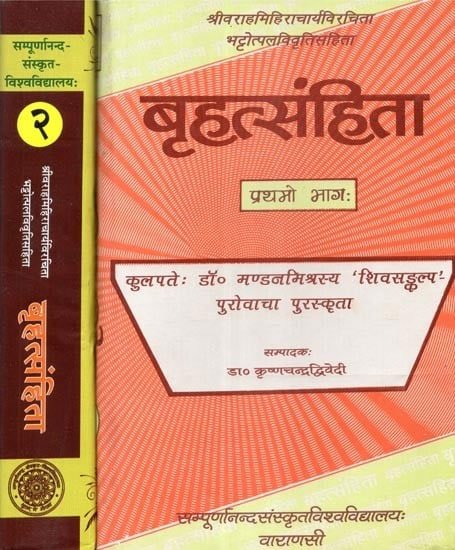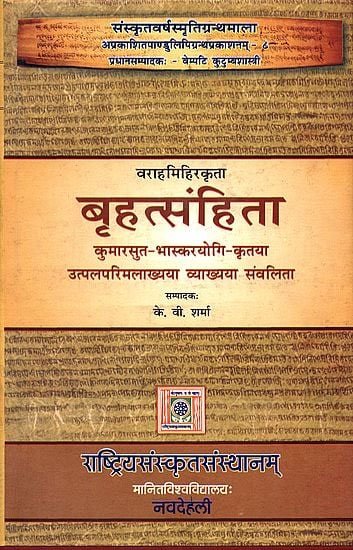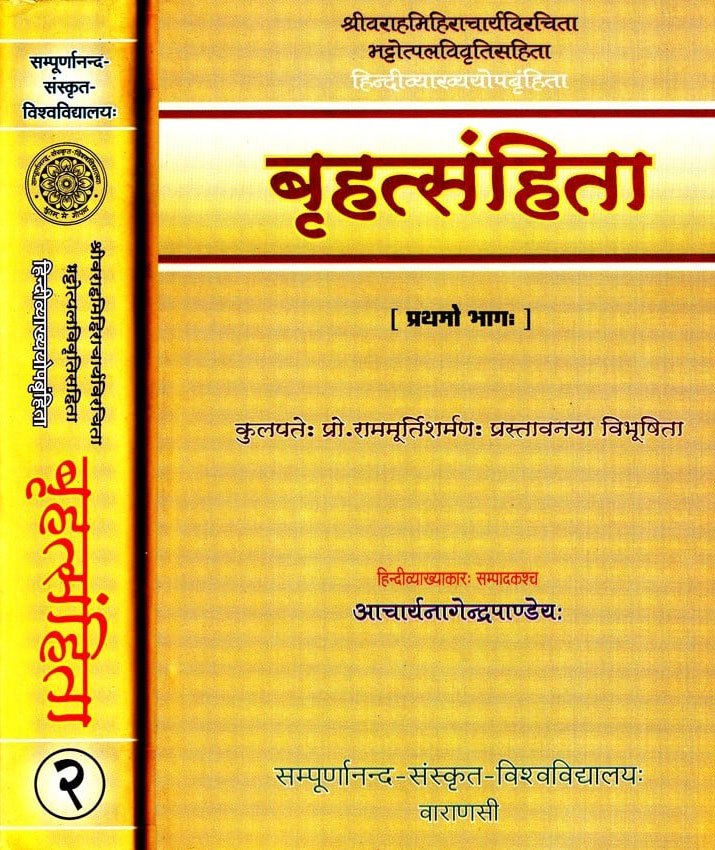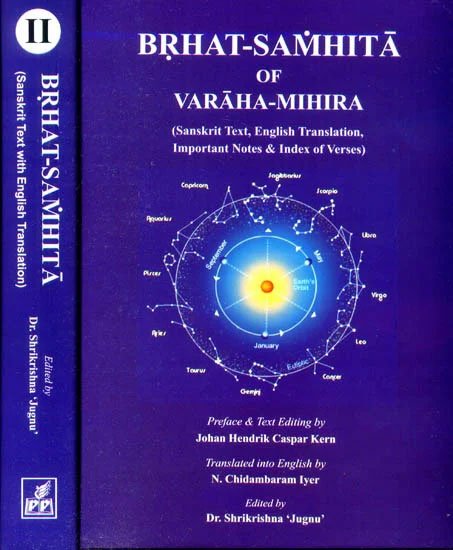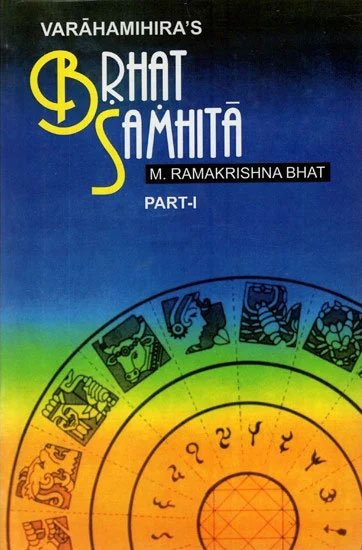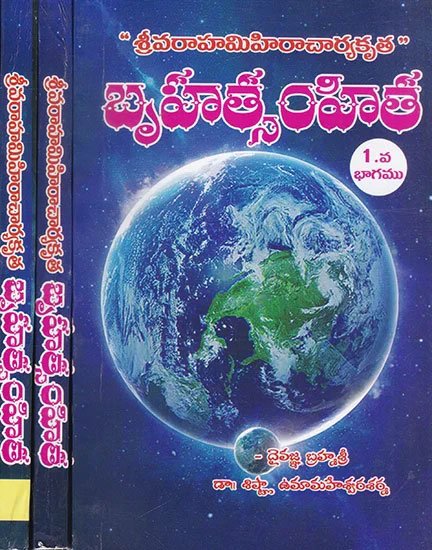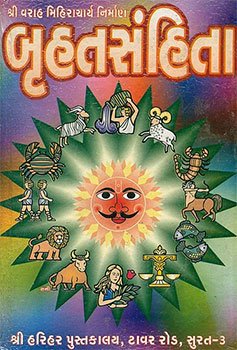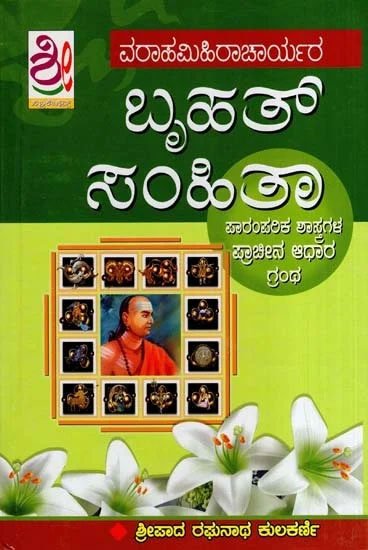Brihat-samhita [sanskrit]
26,560 words
The Sanskrit text of the Brihat-samhita from the 6th-century authored by Varaha Mihira in present-day Ujjain, India. It primarily deals with astrology and astronomy but is presented as an encyclopedia of knowledge.
Verse 103.63
भृगुसुतदिवसे च चित्रवस्त्रवृष्यवेश्यकामिनीविलासहासयौवनोपभोगरम्यभूमयः ।
स्फटिकरजतमन्मथोपचारवाहनेक्षुशारदप्रकारगोवणिक्कृषीवलौषधाम्बुजानि ॥
सवितृसुतदिने च कारयेन्महिष्यजोष्ट्रकृष्णलोहदासवृद्धनीचकर्मपक्षिचौरपाशिकान् ।
च्युतविनयविशीर्णभाण्डहस्त्यपेक्षविघ्नकारणानि च अन्यथा न साधयेत्समुद्रगोऽप्यपां कणम् ॥ ६३ ॥
bhṛgusutadivase ca citravastravṛṣyaveśyakāminīvilāsahāsayauvanopabhogaramyabhūmayaḥ |
sphaṭikarajatamanmathopacāravāhanekṣuśāradaprakāragovaṇikkṛṣīvalauṣadhāmbujāni ||
savitṛsutadine ca kārayenmahiṣyajoṣṭrakṛṣṇalohadāsavṛddhanīcakarmapakṣicaurapāśikān |
cyutavinayaviśīrṇabhāṇḍahastyapekṣavighnakāraṇāni ca anyathā na sādhayetsamudrago'pyapāṃ kaṇam || 63 ||
The Sanskrit text of Verse 103.63 is contained in the book Brihata Samhita (Sanskrit Text with Hindi Translation) by Pandit Achyutananda Jha. This book is available online or you could buy the latest edition:
Read online Buy now! The Sanskrit text by Pandit Achyutananda Jha (2001)
Glossary of Sanskrit terms
Note: This extracts Sanskrit terms and links to English definitions from the glossary, based on an experimental segmentation of verse (103.63). Some terms could be superfluous while some might not be mentioned. Click on the word to show English definitions.
Bhrigusuta, Divasa, Citra, Vastri, Vastra, Ava, Avi, Ishin, Ishya, Ish, Akamin, Akamini, Akami, Vilasa, Hasa, Bhoga, Ramya, Bhumaya, Bhumi, Sphatika, Rajata, Matha, Mathin, Mathu, Math, Upacaru, Ahan, Nri, Sharada, Prakara, Vanij, Krishivala, Aushadha, Ambuja, Savitrisutadina, Mahishi, Aja, Ushtra, Krishnaloha, Dasa, Vriddha, Nicakarman, Pakshin, Pakshi, Caura, Pashika, Cyuta, Vinaya, Vishirna, Bhanda, Hastin, Hastya, Hasti, Apa, Iksha, Vighna, Karana, Anyatha, Samudraga, Api, Apya, Kana,
Analysis of Sanskrit grammar
Note: this is an experimental feature and only shows the first possible analysis of the Sanskrit text (Verse 103.63). If the system was successful in segmenting the sentence, you will see of which words it is made up of, generally consisting of Nouns, Pronouns, Verbs, Participles and Indeclinables. Click on the link to show all possible derivations of the word.
- Line 1: “bhṛgusutadivase ca citravastravṛṣyaveśyakāminīvilāsahāsayauvanopabhogaramyabhūmayaḥ ”
- bhṛgusuta -
-
bhṛgusuta (noun, masculine)[compound], [vocative single]
- divase -
-
divasa (noun, masculine)[locative single]
- ca -
-
ca (indeclinable conjunction)[indeclinable conjunction]ca (noun, masculine)[compound], [vocative single]ca (noun, neuter)[compound], [vocative single]
- citra -
-
citra (noun, masculine)[compound], [vocative single]citra (noun, neuter)[compound], [vocative single]
- vastra -
-
vastṛ (noun, masculine)[compound], [adverb]vastṛ (noun, neuter)[compound], [adverb], [nominative single], [vocative single], [accusative single]vastra (noun, neuter)[compound], [vocative single]
- avṛṣya -
-
√vṛ (verb class 5)[aorist middle first single]√vṛ (verb class 9)[aorist middle first single]
- ave -
-
ava (noun, masculine)[compound], [vocative single], [locative single]o (noun, masculine)[compound], [instrumental single], [dative single]avi (noun, masculine)[vocative single]avi (noun, feminine)[vocative single]u (noun, masculine)[dative single]√av (verb class 1)[imperative active second single]√u (verb class 1)[present middle first single], [imperative active second single]
- īśya -
-
īśin (noun, masculine)[compound], [adverb], [nominative single]īśin (noun, neuter)[compound], [adverb], [nominative single], [vocative single], [accusative single]√īś -> īśya (absolutive)[absolutive from √īś]√īś -> īśya (participle, masculine)[vocative single from √īś class 2 verb]√īś -> īśya (participle, neuter)[vocative single from √īś class 2 verb]īś (noun, masculine)[locative single]
- akāminī -
-
akāminī (noun, feminine)[compound], [nominative single]akāmin (noun, neuter)[nominative dual], [vocative dual], [accusative dual]akāmī (noun, neuter)[nominative dual], [vocative dual], [accusative dual]
- vilāsa -
-
vilāsa (noun, masculine)[compound], [vocative single]vilāsa (noun, neuter)[compound], [vocative single]
- hāsayau -
-
hāsā (noun, feminine)[instrumental single]√has (verb class 0)[imperative active second single]
- auvan -
-
√u (verb class 2)[imperfect active third plural]
- opa -
-
- bhoga -
-
bhoga (noun, masculine)[compound], [vocative single]bhoga (noun, neuter)[compound], [vocative single]
- ramya -
-
ramya (noun, masculine)[compound], [vocative single]ramya (noun, neuter)[compound], [vocative single]√ram -> ramya (participle, masculine)[compound from √ram]√ram -> ramya (participle, neuter)[compound from √ram]√ram -> ramya (absolutive)[absolutive from √ram]√ram -> ramya (participle, masculine)[vocative single from √ram class 1 verb], [vocative single from √ram]√ram -> ramya (participle, neuter)[vocative single from √ram class 1 verb], [vocative single from √ram]
- bhūmayaḥ -
-
bhūmaya (noun, masculine)[nominative single]bhūmi (noun, feminine)[nominative plural], [vocative plural]bhūmi (noun, masculine)[nominative plural], [vocative plural]
- Line 2: “sphaṭikarajatamanmathopacāravāhanekṣuśāradaprakāragovaṇikkṛṣīvalauṣadhāmbujāni |”
- sphaṭika -
-
sphaṭika (noun, masculine)[compound], [vocative single]
- rajatam -
-
rajata (noun, masculine)[adverb], [accusative single]rajata (noun, neuter)[adverb], [nominative single], [accusative single]rajatā (noun, feminine)[adverb]√raj (verb class 1)[imperative active second dual]√rañj (verb class 1)[imperative active second dual]
- an -
-
ad (noun, masculine)[compound], [adverb], [nominative single], [vocative single]ad (noun, neuter)[compound], [adverb], [nominative single], [vocative single], [accusative single]
- matho -
-
mathā (indeclinable)[indeclinable]matha (noun, masculine)[compound], [vocative single]mathā (noun, feminine)[nominative single]mathin (noun, masculine)[instrumental single]mathu (noun, masculine)[vocative single]math (noun, masculine)[instrumental single]math (noun, neuter)[instrumental single]√manth (verb class 1)[imperative active second single]
- upacāravā -
-
upacāru (noun, masculine)[vocative single]
- āha -
-
āhan (noun, neuter)[compound], [adverb], [nominative single], [accusative single]√ah (verb class 5)[perfect active third single]
- ne -
-
na (indeclinable particle)[indeclinable particle]na (noun, masculine)[compound], [vocative single], [locative single]na (noun, neuter)[compound], [nominative dual], [vocative single], [vocative dual], [accusative dual], [locative single]nā (noun, feminine)[nominative single], [nominative dual], [vocative single], [vocative dual], [accusative dual]ni (noun, masculine)[vocative single]ni (noun, feminine)[vocative single]nṛ (noun, masculine)[nominative single]
- ikṣu -
-
ikṣu (noun, masculine)[compound], [adverb]
- śārada -
-
śārada (noun, masculine)[compound], [vocative single]śārada (noun, neuter)[compound], [vocative single]
- prakāra -
-
prakāra (noun, masculine)[compound], [vocative single]
- go -
-
go (noun, masculine)[compound]ga (noun, masculine)[nominative single]gu (noun, feminine)[vocative single]
- vaṇik -
-
vaṇij (noun, masculine)[compound], [adverb], [nominative single], [vocative single]
- kṛṣīvalau -
-
kṛṣīvala (noun, masculine)[compound], [nominative dual], [vocative single], [vocative dual], [accusative dual]
- auṣadhā -
-
auṣadha (noun, masculine)[compound], [vocative single]auṣadha (noun, neuter)[compound], [vocative single]
- ambujāni -
-
ambuja (noun, neuter)[nominative plural], [vocative plural], [accusative plural]
- Line 3: “savitṛsutadine ca kārayenmahiṣyajoṣṭrakṛṣṇalohadāsavṛddhanīcakarmapakṣicaurapāśikān ”
- savitṛsutadine -
-
savitṛsutadina (noun, neuter)[nominative dual], [vocative dual], [accusative dual], [locative single]
- ca -
-
ca (indeclinable conjunction)[indeclinable conjunction]ca (noun, masculine)[compound], [vocative single]ca (noun, neuter)[compound], [vocative single]
- kārayen -
-
√kṛ (verb class 0)[optative active third single]
- mahiṣya -
-
mahiṣi (noun, masculine)[compound], [adverb], [nominative dual], [vocative dual], [accusative dual]mahiṣī (noun, feminine)[compound], [adverb], [nominative single], [vocative single]
- ajo -
-
aja (noun, masculine)[compound], [vocative single]aja (noun, neuter)[compound], [vocative single]ajā (noun, feminine)[nominative single]√aj (verb class 1)[imperative active second single]
- uṣṭra -
-
uṣṭra (noun, masculine)[compound], [vocative single]
- kṛṣṇaloha -
-
kṛṣṇaloha (noun, neuter)[compound], [vocative single]
- dāsa -
-
dāsa (noun, masculine)[compound], [vocative single]dāsa (noun, neuter)[compound], [vocative single]√dās (verb class 1)[imperative active second single]√das (verb class 1)[imperative active second single]
- vṛddha -
-
vṛddha (noun, masculine)[compound], [vocative single]vṛddha (noun, neuter)[compound], [vocative single]√vṛdh -> vṛddha (participle, masculine)[vocative single from √vṛdh class 1 verb]√vṛdh -> vṛddha (participle, neuter)[vocative single from √vṛdh class 1 verb]
- nīcakarma -
-
nīcakarman (noun, masculine)[compound]nīcakarman (noun, neuter)[compound], [adverb], [nominative single], [vocative single], [accusative single]
- pakṣi -
-
pakṣi (noun, masculine)[compound], [adverb]pakṣin (noun, masculine)[compound], [adverb]pakṣin (noun, neuter)[compound], [adverb], [nominative single], [vocative single], [accusative single]pakṣī (noun, masculine)[adverb], [vocative single]pakṣī (noun, feminine)[compound], [adverb], [vocative single]pakṣī (noun, neuter)[compound], [adverb], [nominative single], [vocative single], [accusative single]√pac (verb class 1)[injunctive middle first single]√pac (verb class 4)[injunctive middle first single]
- caura -
-
caura (noun, masculine)[compound], [vocative single]caura (noun, neuter)[compound], [vocative single]
- pāśikān -
-
pāśika (noun, masculine)[accusative plural]
- Line 4: “cyutavinayaviśīrṇabhāṇḍahastyapekṣavighnakāraṇāni ca anyathā na sādhayetsamudrago'pyapāṃ kaṇam ”
- cyuta -
-
cyuta (noun, masculine)[compound], [vocative single]cyuta (noun, neuter)[compound], [vocative single]
- vinaya -
-
vinaya (noun, masculine)[compound], [vocative single]vinaya (noun, neuter)[compound], [vocative single]
- viśīrṇa -
-
viśīrṇa (noun, masculine)[compound], [vocative single]viśīrṇa (noun, neuter)[compound], [vocative single]
- bhāṇḍa -
-
bhāṇḍa (noun, masculine)[compound], [vocative single]bhāṇḍa (noun, neuter)[compound], [vocative single]
- hastya -
-
hastin (noun, masculine)[compound], [adverb], [nominative single]hastin (noun, neuter)[compound], [adverb], [nominative single], [vocative single], [accusative single]hastya (noun, masculine)[compound], [vocative single]hastya (noun, neuter)[compound], [vocative single]hastī (noun, masculine)[compound], [adverb], [vocative single]hastī (noun, feminine)[compound], [adverb], [nominative single], [vocative single]hastī (noun, neuter)[compound], [adverb], [nominative single], [vocative single], [accusative single]
- ape -
-
apa (indeclinable)[indeclinable]ap (noun, neuter)[instrumental single], [dative single]
- īkṣa -
-
īkṣa (noun, masculine)[compound], [vocative single]īkṣa (noun, neuter)[compound], [vocative single]
- vighna -
-
vighna (noun, masculine)[compound], [vocative single]
- kāraṇāni -
-
kāraṇa (noun, neuter)[nominative plural], [vocative plural], [accusative plural]
- ca -
-
ca (indeclinable conjunction)[indeclinable conjunction]ca (noun, masculine)[compound], [vocative single]ca (noun, neuter)[compound], [vocative single]
- anyathā* -
-
anyathā (noun, feminine)[nominative plural], [vocative plural], [accusative plural]
- na -
-
na (indeclinable particle)[indeclinable particle]na (noun, masculine)[compound], [vocative single]na (noun, neuter)[compound], [vocative single]
- sādhayet -
-
√sidh (verb class 0)[optative active third single]
- samudrago' -
-
samudraga (noun, masculine)[nominative single]
- apya -
-
api (indeclinable preposition)[indeclinable preposition]apya (noun, masculine)[compound], [vocative single]ap (noun, neuter)[nominative dual], [vocative dual], [accusative dual], [locative single]api (Preverb)[Preverb]
- apām -
-
ap (noun, feminine)[genitive plural]ap (noun, neuter)[genitive plural]√pā (verb class 1)[aorist active first single]√pā (verb class 2)[imperfect active first single], [aorist active first single]√pā (verb class 2)[imperfect active first single]
- kaṇam -
-
kaṇa (noun, masculine)[adverb], [accusative single]kaṇa (noun, neuter)[adverb], [nominative single], [accusative single]kaṇā (noun, feminine)[adverb]
Other editions:
Also see the following editions of the Sanskrit text or (alternative) English translations of the Verse 103.63
Brhatsamhita with the Commentary of Bhattotpala
by Krishna Chandra Dwivedi (2016)
Publisher: Sampurnanand Sanskrit University; 1229 pages;
Buy now!
Brihat Samhita with the Commentary of Utpalapatimala of Yogisvara
by K. V. Sharma (2012)
Publisher: Rashtriya Sanskrit Sansthan, Janakpuri; 754 pages; ISBN-10; 8186111360; ISBN-13: 9788186111369
Buy now!
Brihat Samhita (Hindi Translation)
by K. V. Sharma (2002)
Publisher: Sampurnanand Sanskrit University; 2359 pages; ISBN-13: 9789387890008.
Buy now!
Brhat Samhita (English translation)
by N. Chidambaram Iyer (2022)
Publisher: Parimal Publication Pvt. Ltd.; 801 pages; Edited by Dr. Shrikrishna Jugnu; ISBN-10: 8171104215; ISBN-13: 9788171104215.
Buy now!
Brhat Samhita (English with notes)
by M. Ramakrishna Bhat (2010)
Publisher: Motilal Banarsidas Publishers Pvt. Ltd.; 1155 pages; ISBN-10: 8120810600; ISBN-13: 9788120810600.
Buy now!
Brhat Samhita (Telugu translation)
by Sishtla Umamaheswara Sharma (2020)
Publisher: Mohan Publications, Andhra Pradesh; 846 pages.
Buy now!Preview of verse 103.63 in Kannada sript:
ಭೃಗುಸುತದಿವಸೇ ಚ ಚಿತ್ರವಸ್ತ್ರವೃಷ್ಯವೇಶ್ಯಕಾಮಿನೀವಿಲಾಸಹಾಸಯೌವನೋಪಭೋಗರಮ್ಯಭೂಮಯಃ ।
ಸ್ಫಟಿಕರಜತಮನ್ಮಥೋಪಚಾರವಾಹನೇಕ್ಷುಶಾರದಪ್ರಕಾರಗೋವಣಿಕ್ಕೃಷೀವಲೌಷಧಾಮ್ಬುಜಾನಿ ॥
ಸವಿತೃಸುತದಿನೇ ಚ ಕಾರಯೇನ್ಮಹಿಷ್ಯಜೋಷ್ಟ್ರಕೃಷ್ಣಲೋಹದಾಸವೃದ್ಧನೀಚಕರ್ಮಪಕ್ಷಿಚೌರಪಾಶಿಕಾನ್ ।
ಚ್ಯುತವಿನಯವಿಶೀರ್ಣಭಾಣ್ಡಹಸ್ತ್ಯಪೇಕ್ಷವಿಘ್ನಕಾರಣಾನಿ ಚ ಅನ್ಯಥಾ ನ ಸಾಧಯೇತ್ಸಮುದ್ರಗೋಽಪ್ಯಪಾಂ ಕಣಮ್ ॥ ೬೩ ॥
Brhat Samhita (Gujarati translation)
by - (2000)
Publisher: Shree Harihar Pustakalay, Surat; Author: Shri Varahamihira Acharya (શ્રી વરાહમિહીરાચાર્ય); 432 pages.
Buy now!Preview of verse 103.63 in Gujarati sript:
ભૃગુસુતદિવસે ચ ચિત્રવસ્ત્રવૃષ્યવેશ્યકામિનીવિલાસહાસયૌવનોપભોગરમ્યભૂમયઃ ।
સ્ફટિકરજતમન્મથોપચારવાહનેક્ષુશારદપ્રકારગોવણિક્કૃષીવલૌષધામ્બુજાનિ ॥
સવિતૃસુતદિને ચ કારયેન્મહિષ્યજોષ્ટ્રકૃષ્ણલોહદાસવૃદ્ધનીચકર્મપક્ષિચૌરપાશિકાન્ ।
ચ્યુતવિનયવિશીર્ણભાણ્ડહસ્ત્યપેક્ષવિઘ્નકારણાનિ ચ અન્યથા ન સાધયેત્સમુદ્રગોઽપ્યપાં કણમ્ ॥ ૬૩ ॥
Brhat Samhita (Kannada translation)
by Sripada Raghunatha Kulkarni (2021)
Publisher: Srinidhi Publications, Bangalore; 668 pages with illustrations.
Buy now!Preview of verse 103.63 in Kannada sript:
ಭೃಗುಸುತದಿವಸೇ ಚ ಚಿತ್ರವಸ್ತ್ರವೃಷ್ಯವೇಶ್ಯಕಾಮಿನೀವಿಲಾಸಹಾಸಯೌವನೋಪಭೋಗರಮ್ಯಭೂಮಯಃ ।
ಸ್ಫಟಿಕರಜತಮನ್ಮಥೋಪಚಾರವಾಹನೇಕ್ಷುಶಾರದಪ್ರಕಾರಗೋವಣಿಕ್ಕೃಷೀವಲೌಷಧಾಮ್ಬುಜಾನಿ ॥
ಸವಿತೃಸುತದಿನೇ ಚ ಕಾರಯೇನ್ಮಹಿಷ್ಯಜೋಷ್ಟ್ರಕೃಷ್ಣಲೋಹದಾಸವೃದ್ಧನೀಚಕರ್ಮಪಕ್ಷಿಚೌರಪಾಶಿಕಾನ್ ।
ಚ್ಯುತವಿನಯವಿಶೀರ್ಣಭಾಣ್ಡಹಸ್ತ್ಯಪೇಕ್ಷವಿಘ್ನಕಾರಣಾನಿ ಚ ಅನ್ಯಥಾ ನ ಸಾಧಯೇತ್ಸಮುದ್ರಗೋಽಪ್ಯಪಾಂ ಕಣಮ್ ॥ ೬೩ ॥
![Brihat-samhita [sanskrit] - book cover](/uploads/a/Brihat-Samhita-Sanskrit.jpg)
